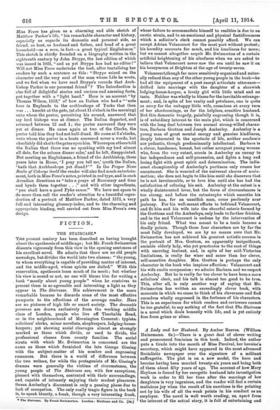FICTION.
THE STAIRCASE.*
THE present century has been described as having brought about the apotheosis of middle age ; but Mr. Frank Swinnerton dissents vigorously from this view in the opening sentences of his excellent novel He admits that there are no old people nowadays, but divides the world into two classes: "the young, to whom everything is capable of providing matter of interest, and the middle-aged, whose spirits are dulled." With this reservation, apotheosis loses much of its merit ; but whether his view is sound or not, no one will blame him for writing a , book "mostly about young people" when he contrives to present them in so agreeable and interesting a light as they appear in The Staircase. His achievement is the more remarkable because he discards some of the most effective passports to the affections of the average reader. Here are no pictures of high life or smart society. The dramatis personae are drawn exclusively from the working middle class of London, people who live off Theobalds Road, or in the neighbourhood of Mornington Crescent: typists, solicitors' clerks, minor novelists, shopkeepers, lodging-house- keepers; yet showing social cleavages almost as strongly marked as those which divide, or used to divide, the professional classes from county families. The social strata with which Mr. Swinnerton is concerned are the same as those which furnished the late George (lining with the subject-matter of his sombre and engrossing romances. But there is a world of difference between the two writers, for while the protagonists of Mr. Giesing's dramas were generally the victims of circumstance, the young people of The Staircase are, with few exceptions, pleased with themselves, contented with their surroundings, and capable of intensely enjoying their modest pleasures. Susan Amberley's discontent is only a passing phase due to lack of occupation. The only really tragic figure in the book is, to speak bluntly, a freak, though a very interesting freak,
• Ti,. Staircasa. By Fgank Bwinnerton. London: Mothnon and Co. [6a.] whose failure to accommodate himself to realities is due to an exotic strain, and to an emotional and physical fastidiousness which a solicitor's clerk cannot possibly afford. We can accept Adrian Velancourt for the most part without protest; his heredity accounts for much, and his loneliness for more; but we cannot altogether acquit Mr. Swinnerton of a certain• artificial heightening of his aloofness when we are asked to believe that Velancourt never saw the sea until he saw it on his honeymoon at Brighton at the age of twenty-seven.
Velancourt,though far more sensitively organized and natur- ally refined than any of the other young people in the book—he had all the equipment of a poet except articulate utterance— drifted into marriage with the daughter of a shrewish lodging-house-keeper, a lovely girl with little mind and no taste. Neither was wholly to blame for the inevitable estrange- ment; and, in spite of her vanity and petulance, one is quite as sorry for the unhappy little wife, conscious at every turn of her shortcomings, as for the helpless, sensitive husband. But this domestic tragedy, painfully engrossing though it is, is of subsidiary interest to the main plot, which is concerned with the long duel between two normal strong-willed charae- ters, Barbara Gretton and Joseph Amberley. Amberley is a young man of great mental energy and genuine kindliness, deeply interested in the spectacle of life, neither academic nor pedantic, though predominantly intellectual. Barbara is a clever, handsome, honest, but rather arrogant young woman who, from the very outset, scents in Amberley an enemy to her independence and self-possession, and fights a long and losing fight with great spirit and determination. The indis- creet championship of Amberley's partisans only rouses her resentment. She is wearied of the universal chorus of accla- mation; she does not begin to like him until she discovers that he is not invulnerable, or to love him until she has had the satisfaction of refusing his suit. Amberley at the outset is a wholly disinterested lover, but the force of circumstances is too strong, and before the catastrophe which smooths his path he has, for an unselfish man, come perilously near jealousy. For his well-meant efforts to befriend Velancourt, and fit him and his wife into the cheerful coterie formed by the Grettons and the Amberleys, only leads to further friction, and in the end Velancourt is undone by the intervention of his only friend. What was meant to be a tonic became a deadly poison. Though these four characters are by far the most fully developed, we are by no means sure that Mr. Swinnerton has not achieved his greatest artistic success in the portrait of Mrs. Gretton, an apparently insignificant, amiable elderly lady, who yet penetrates to the root of things with unerring instinct, and, in spite of her mid-Victorian limitations, is really far wiser and saner than her clever, self-assertive daughter. Mrs. Gretton is perhaps the only character in the book who inspires affection: Velaucourt and his wife excite compassion: we admire Barbara and we respect Amberley. But he is really far too clever to have been a mere solicitors' clerk, and his talk is almost too good to be tree. This, after all, is only another way of saying that Mr. Swinnerton has written an exceedingly clever book, with moments in which we cease to think of his cleverness and find ourselves wholly engrossed in the fortunes of his characters. This is an experience for which readers and reviewers cannot be too grateful, to say nothing of the fact that The Staircase is a novel which deals honestly with life, and is yet entirely free from grime or slime.






































 Previous page
Previous page